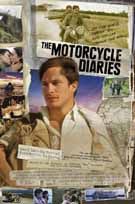In The Motorcycle Diaries, two Argentinean men take a decrepit motor bike and set off on an all-encompassing journey around South America. Both are real historical figures, and one of them will eventually become a leader in the Cuban communist revolution. Their story starts off as an expedition of camaraderie and a celebration of the beauty of South America, but soon turns into a preachy plea for the sick and impoverished.
Ché Guevara (Gael Garcia Bernal) and Alberto Granado (Rodrigo De la Serna) are two very different men from a metropolitan area of Argentina, circa 1952. For Alberto their trip around South America, with only their wits to see them through, is a lifelong dream come true. He’s been planning it for decades, and now as his 30th birthday approaches he’s determined to celebrate it on the road. Ché is an ordinary 23 year old, who despite nearly being done with his medical degree, decides to take a break and accompany his friend Alberto.
The two set off from home on Alberto’s aged and smoking motorcycle, which Alberto has affectionately dubbed “The Mighty One”. Their travels take them first for a visit to Guevara’s beautiful but impatient girlfriend, and then across the border into Chile where they will begin in earnest their circle of the continent. It’s here that you’ll start wishing you’d brought a map into the theater, since the film itself is largely unconcerned with making clear the paths it travels. While I realize that The Motorcycle Diaries’ director Walter Salles was probably going for a mass perception of the continent as a whole, and thus may have been hesitant to break it down into maps and lines, for an ignorant North American such as myself a visual aid would have been nice.
Even without understanding exactly where Ché and Alberto are en route, the adventure itself is enjoyable. Starting out on that old motorcycle and ending up drifting down the Amazon on a raft, things develop at an easy pace, the relationship between Ché and Alberto sprinkled with just the right amounts of camaraderie and when things go wrong, antagonism. Rodrigo De la Serna turns in a wonderfully charismatic performance as the often selfish Alberto, defining himself by the women he manages to hook up with in every town. Ché on the other hand starts out as an ordinary pretty boy, but slowly goes through a process of spiritual tumult as he encounters the realities of poverty and disease. The Latin Freddie Prinze Jr. look-alike Gael Garcia Bernal does a capable job as Guevara, but often seems distant.
I had fun following Ché and Alberto in their travels, as the movie at first establishes itself as a basic road pic. But things sag in the later acts when Salles tries to shift the focus from their trip to the plight of the poor and sick in the continent. It’s a weird tonal shift that leaves you feeling as if Salles suddenly decided his movie needed to be more didactic. The friendship between Ché and Alberto becomes a mere footnote as Ché throws himself in amongst a colony of lepers like Jane Goodall obsessing over mountain gorillas. His idealism is commendable and perhaps even interesting as a study in what builds the character of a future communist revolutionary, but this seems like such a departure from the initial rhythms of the flick that I found it annoying.
Of note is that the film is subtitled for English speaking audiences. That’s no surprise, since the practice of dubbing seems to have (thankfully) gone out of vogue in Hollywood. But what’s annoying is that the subtitles themselves are often washed out in the picture. White colors and brighter scenes mean that you’ll miss some of the dialogue, or miss out on whatever is happening in the movie as you focus all your attention on trying to make out words. Throwing some decent subtitles at the bottom of the screen isn’t a difficult maneuver, but an important one if you’re going to ship a foreign language film out to English speaking audiences. Abhorrent though it is, even dubbing is preferable to subtitles that are unusually difficult to read.
The Motorcycle Diaries is the true story of a man who would become a communist crusader, so perhaps I should be more forgiving of its sermonic nature in the interests of history. Still, the film starts as a Spanish language buddy movie and ends up as a pamphlet for the evils of democracy. There had to be a better way to make that transition. The shift, while gradual, is also jarring. In spite of that, The Motorcycle Diaries is a beautiful and well-meaning film. The chemistry between Bernal and Serna works as a way to tell a very personal tale with a simple theme about the loss of innocence. You don’t have to share Ché Guevara’s political beliefs to appreciate that. The journey is worth the preachy pro-communism price.
Most Popular




